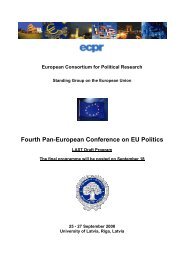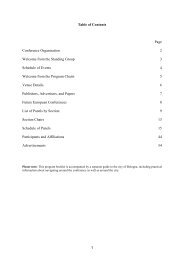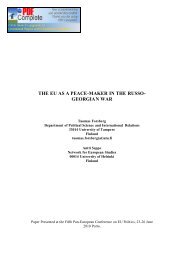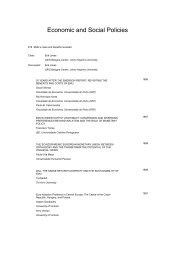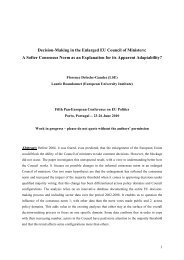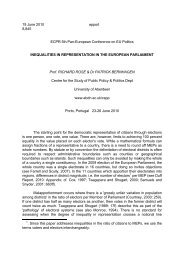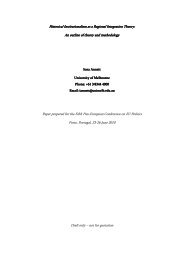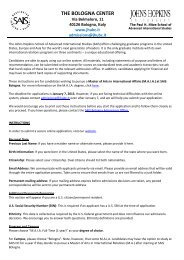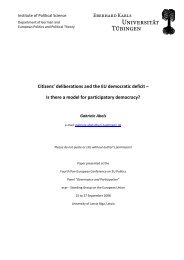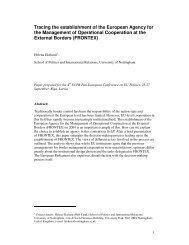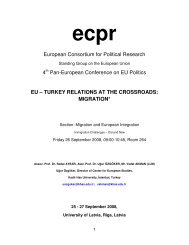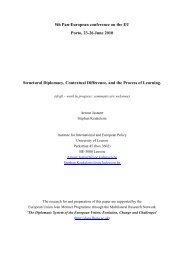You also want an ePaper? Increase the reach of your titles
YUMPU automatically turns print PDFs into web optimized ePapers that Google loves.
22 SAIS BOLOGNA<br />
DEGREES AND OTHER PROGRAMS<br />
23<br />
study, may spend a second year of study at<br />
SAIS <strong>Bologna</strong>. Upon completion of a thesis and<br />
six additional courses they will be awarded<br />
the M.A.I.A. by SAIS.<br />
M.A.I.A. - Laurea Magistrale Program<br />
SAIS <strong>Bologna</strong> and University of <strong>Bologna</strong>,<br />
Facoltà di Scienze Politiche,<br />
<strong>Bologna</strong> and Forlì<br />
This two-year program can be completed either<br />
by spending the first year at SAIS <strong>Bologna</strong> and<br />
the second year at the University of <strong>Bologna</strong> or<br />
the University of <strong>Bologna</strong>, Forlì, or vice versa.<br />
Students must apply separately to both<br />
institutions. Students who begin at the<br />
University of <strong>Bologna</strong>, take six additional<br />
courses and complete a thesis during a second<br />
year at SAIS <strong>Bologna</strong> may receive both a<br />
Laurea Magistrale in Scienze Internazionali e<br />
Diplomatiche (International Relations and<br />
Diplomatic Affairs) and an M.A.I.A. degree.<br />
Students who complete their first year<br />
course work at SAIS <strong>Bologna</strong> and then continue<br />
at the University of <strong>Bologna</strong>, Forlì will receive<br />
credit toward the Laurea Magistrale in Scienze<br />
Internazionali e Diplomatiche for the courses<br />
taken at the <strong>Center</strong>.<br />
Doctoral Program<br />
Doctor of Philosophy (Ph.D.)<br />
This fulltime program is for individuals who hold<br />
an M.A. and seek to become scholars as well<br />
as practitioners in international relations. Ph.D.<br />
candidates work with a faculty adviser to design<br />
a unique academic and research plan to<br />
prepare for their dissertation. Students develop<br />
a comprehensive understanding of qualitative<br />
and quantitative analytic skills, international relations,<br />
economics and regional studies. Ph.D.<br />
students may conduct portions of their research<br />
in <strong>Bologna</strong> and/or Nanjing.<br />
General Information<br />
Approximately one-half of all SAIS M.A.<br />
candidates spend their first year at the <strong>Bologna</strong><br />
<strong>Center</strong>. Courses at the <strong>Center</strong> are taught in<br />
English and, whenever possible, classes are<br />
conducted as small seminars.<br />
M.A. candidates concentrate in two<br />
programs, one of which must be in International<br />
Economics. The second program is chosen by<br />
the student either during the application<br />
process (see International Development) or at<br />
the beginning of their studies. Most M.A.<br />
concentrations require completion of approximately<br />
six courses in the program, leaving<br />
space for elective courses over the two years<br />
of study. Faculty advisers are available to assist<br />
students with their choice of program and<br />
courses during orientation and throughout<br />
their studies.<br />
Courses at the <strong>Bologna</strong> <strong>Center</strong> are classified<br />
as follows: Core Courses, International<br />
Economics, International Relations, International<br />
Development, American Foreign Policy,<br />
European Studies, Middle East Studies and<br />
Western Hemisphere Studies/Latin American<br />
Studies.<br />
Available Concentrations<br />
at the <strong>Bologna</strong> <strong>Center</strong><br />
With the exception of Asian Studies, all concentrations<br />
are available in <strong>Bologna</strong>. Most SAIS<br />
students concentrating in European Studies,<br />
American Foreign Policy, and International Relations<br />
begin their studies in <strong>Bologna</strong>.<br />
Candidates for the M.A. should select their<br />
second program of concentration and choose<br />
their courses only after carefully reviewing the<br />
requirements and consulting with faculty advisers<br />
in <strong>Bologna</strong>.<br />
Core Requirements<br />
Core requirements for the M.A. degree at<br />
SAIS <strong>Bologna</strong> are divided in four areas:<br />
Evolution of the International System, Theories<br />
of International Relations, America and the<br />
World Since 1945, and Comparative National<br />
Systems. M.A. candidates must pass written<br />
examinations in two of these core areas (except<br />
students in European Studies, who take three<br />
comprehensive European Studies exams).<br />
Students are urged to pass one of these exams<br />
by the end of their first year and to pass both<br />
before beginning the second year. Students<br />
with an adequate background are encouraged<br />
to take the core examinations upon entry.<br />
During the year, students may prepare for a<br />
core examination by studying on their own,<br />
auditing or enrolling for credit in a core course.<br />
Core exams are graded with “P” (Pass) or<br />
“HP” (Hign Pass). Only passing grades appear<br />
on the transcript. Students who fail a core exam<br />
twice are required to register for the<br />
corresponding core course for credit. After<br />
enrolling for credit, a student’s result of any<br />
prior examination is eliminated from the<br />
transcript, and grading requirements for regular<br />
courses apply. Core exams are offered three<br />
times a year at the <strong>Bologna</strong> <strong>Center</strong>: early in the<br />
academic year and at the end of each semester.<br />
Language Program<br />
Language instruction is an integral part of the<br />
SAIS <strong>Bologna</strong> curriculum. The Language<br />
Program offers courses that help prepare<br />
students for the required oral and written<br />
language proficiency examinations. Classes are<br />
designed to develop communication skills that<br />
are relevant to students’ academic studies and<br />
career goals. A student’s background, area of<br />
concentration and career objectives determine<br />
the language studied.<br />
The <strong>Center</strong> offers beginner to intermediate<br />
level courses in Arabic, French, German, Italian,<br />
Portuguese, Russian and Spanish. English<br />
“I took a course on Thucydides and his<br />
writings on the Peloponnesian War and<br />
a debate course on American Foreign<br />
Policy which combines learing about foreign<br />
policy and also learning how to<br />
speak in public and debate...two great<br />
experiences.”<br />
Martin Orthofer<br />
Vienna, Austria<br />
MA Candidate (B’12) Energy,<br />
Resources, and Environment<br />
Austrian National Bank<br />
Fellowship Recipient



